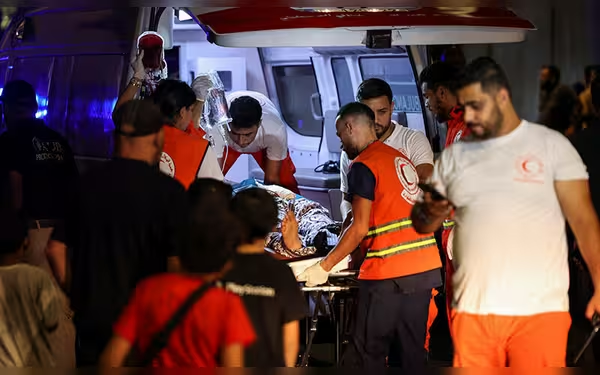Saturday, November 16, 2024 08:50 PM
Hezbollah's Pager Distribution Raises Security Concerns After Explosions
- Hezbollah distributed pagers hours before coordinated explosions.
- Explosions occurred in Hezbollah-controlled regions of Lebanon.
- Security protocols failed to identify risks of new devices.
 Image Credits: dawn.com
Image Credits: dawn.comHezbollah's distribution of pagers before recent explosions raises serious security concerns in Lebanon.
In a shocking turn of events, Lebanon's Hezbollah has come under scrutiny following a series of devastating explosions that rocked its strongholds this week. Reports indicate that the group distributed new Gold Apollo branded pagers to its members just hours before these blasts occurred. This revelation raises serious questions about the safety and security measures in place, especially since there was an ongoing effort to sweep electronic devices for potential threats.
The explosions, which were apparently coordinated, took place in key areas controlled by Hezbollah, including the southern regions of Lebanon, the suburbs of Beirut, and the eastern Bekaa valley. The timing of the pager distribution suggests that Hezbollah was confident in the safety of these devices, despite the ongoing checks aimed at identifying any electronic threats. This confidence is particularly concerning given the scale of the destruction that followed.
Security sources have pointed out that the use of these pagers, which detonated in a synchronized manner, indicates a level of planning and coordination that is alarming. It appears that Hezbollah's members were not only equipped with these devices but were also unaware of the potential risks they posed. This situation highlights a significant lapse in security protocols, raising questions about how such a critical oversight could occur.
As the investigation unfolds, it is essential to consider the implications of this incident. The use of technology in conflict zones is a double-edged sword; while it can enhance communication and coordination, it can also lead to catastrophic outcomes if not properly managed. The events of this week serve as a stark reminder of the importance of rigorous security measures, especially in areas where tensions are high.
The distribution of Gold Apollo pagers by Hezbollah just hours before the explosions not only underscores a troubling lack of foresight but also emphasizes the need for stringent security checks in volatile regions. As the dust settles, it is crucial for all parties involved to reflect on the lessons learned from this incident to prevent future tragedies. The safety of individuals in conflict zones must always be a top priority, and this event serves as a wake-up call for all stakeholders.













